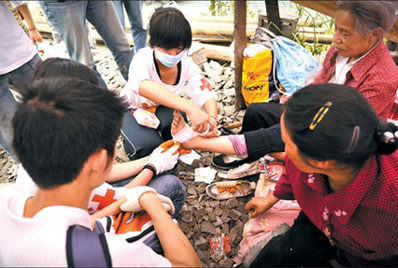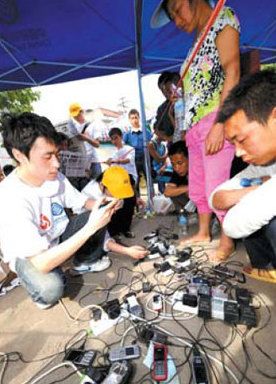Putting others first
By Chen Xiaorong (China Daily)
Updated: 2008-05-22 10:15
Updated: 2008-05-22 10:15
When the quake hit Sichuan on May 12, 58-year-old Zhou Zhongmin immediately got on the train to the province to volunteer his services to victims of the disaster.
Zhou was in neighboring Guizhou province at that time, helping student beneficiaries of international aid organizations.
|
|
Together, with two other volunteers, Zhong headed for the badly damaged and hard-to-reach town of Yingxiu.
But, the trio lost their way and got injured. They were forced to return to Chengdu, the provincial capital of Sichuan.
They tried again two days later.
"Unlike the heavily stricken districts which have already received the government's attention, those disaster areas without access to transportation and telecommunication networks need our help badly," Zhou told Shanghai-based Bund magazine.
Since May 16, there has been no word from Zhou and his two companions. The last communication with the group was they were headed for a tunnel close to Zipingqu reservoir near the quake epicenter on their way to Yingxiu.
Volunteers like Zhou and his two friends have been putting their lives on the line for quake victims, helping form one of the main pillars of rescue and relief efforts in the disaster.
Save The Children, an international non-profit organization (NGO) fighting for children's rights, focuses on another aspect of relief work. Press officer Li Yahui, who is in Sichuan now, told China Daily she and her colleagues are devoted to offering psychological help to children who survived the earthquake.
"We talk with children who were rescued from the debris and soothe their mind," Li said.
Day by day, she gets a better understanding of these children's situations by listening to their heart-wrenching stories. She then reports to headquarters to see how these young sufferers can be helped.
|
|
The NGO has four observation stations around the epicenter to track relief work for children. More stations are under construction. The organization is finding it hard to provide adequate accommodation for the rising number of volunteers who want to help in their efforts.
"A university student in Nanjing came to one of our stations. He overcame all the obstacles and helped other volunteers stay in his relatives' hotel," Li said.
Liu Lei, one of the only United Nations volunteers serving in Sichuan, works as a field interpreter for regional health delegates from the International Federation of Red Cross and Red Crescent Societies. He has been working tirelessly for days, contacting tent producers to provide more tents for homeless quake victims.
"We are lucky to live in tents, to get five hours' sleep a day and have rice sent by local residents and other volunteers, but hundreds of refugees are still waiting for tents," Liu said in hoarse voice.
"All the domestic tent-making factories have run out of stock, while foreign-made tents are quite expensive. I will try my best."
Experts have advised people who want to be volunteers not to show up at the rescue site without contacting any relevant organization or NGO first. People with special skills, such as doctors and counselors, are in greater demand.
A foreign doctor surnamed Robertson organized 16 volunteers, three cars, a truck and an ambulance headed for another badly hit area, Beichuan. He also has professional medical equipment and nurses through a clinic called Heart to Heart he set up 10 years ago in Chengdu. The group had to carry the relief supplies up hills by hand, for several days.
In the past week, people from across the world have continued to express their eagerness to help in quake relief in areas such as medical services, blood donation, shelter construction, and technical assistance.
Many netizens from all walks of life also leave their contact information on major web forums to offer their help.
At the same time, experts warn the relief work is not only hard, but dangerous.
Xiao Bing, a member of a professional mountainous region rescue association, asked firefighters to use a crane to hoist him high above a crumbling building to rescue a survivor buried on the upper floor.
As aftershocks hit, Xiao faced being buried himself. Before he started the rescue work, he told other volunteers to be ready to make sacrifices at any moment and be frank with their families about the dangers involved. They all wrote down their names, identity numbers and addresses on their attire.
Back in Chengdu, The Bookworm, a bookstore that has been assisting those made homeless by the quake, also helped distribute water, medicine, soap and disinfectant to affected areas. The project is being coordinated by a large team of Chinese and international volunteers. Their foreign volunteers have spent days sorting through the enormous amount of donations made to the bookstore for the relief efforts.
"Compared with disaster-relief work in the past, both NGOs and volunteers' contributions have greatly improved this time in terms of the speed of response and the degree of participation," said Jia Xize, vice-director of the NGO institution at Tsinghua University.
|
||
|
||
|
|
|
|

